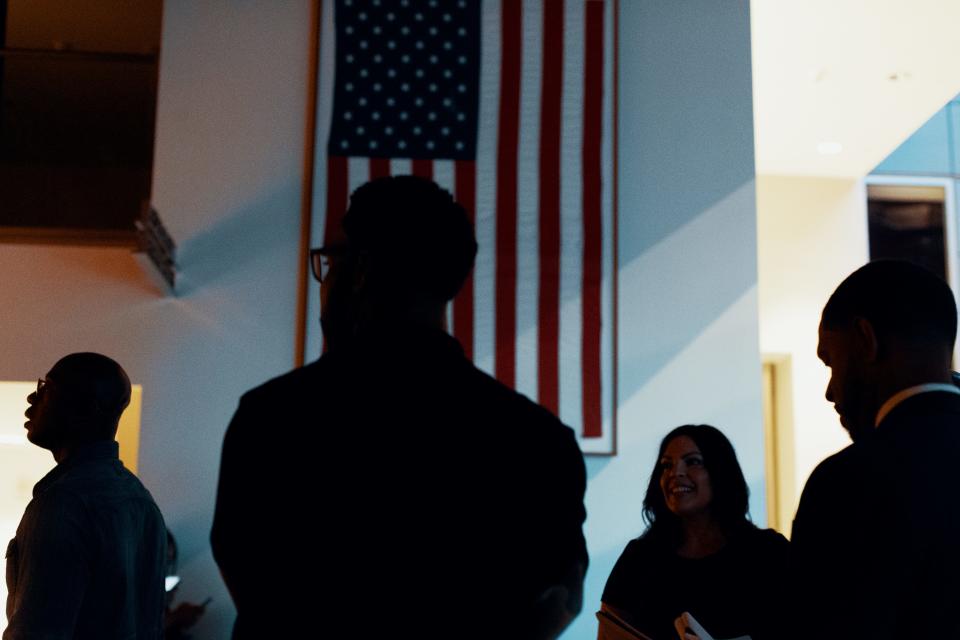Roadside assistance caught the cop who killed my cousin. Justice shouldn't be so rare.
This is a column by Anquan Boldin, a former NFL wide receiver, Super Bowl champion, philanthropist and co-founder of the Players Coalition, a social justice nonprofit.
Six years ago, my cousin Corey Jones, a musician, was driving home from a gig in Jupiter, Florida, when his SUV broke down. He was on the phone with roadside assistance when an undercover officer pulled up in an unmarked vehicle.
The officer, Nouman Raja, asked my cousin whether everything was OK. Corey, who was still on the phone, responded yes.
"Really?" Raja said in a condescending tone.
Then six shots rang out. Three struck Corey. And he was dead.
Raja claimed he acted in self-defense when he killed Corey. But the roadside assistance recording revealed the truth: Corey never posed a threat.
Opinions in your inbox: Get a digest of our takes on current events every day
Raja was ultimately convicted of manslaughter and sentenced to 25 years in prison for killing my cousin. He was the first officer in 30 years to be convicted in Florida for an on-duty shooting.
His conviction was an exception to the norm, so it’s no wonder he thought he could get away with killing my cousin—under regular circumstances he likely would have.
Anytime somebody in the Black community gets stopped by the police, you don’t know how that interaction is going to end. You can be compliant, obey every order and still find yourself in a situation where a rogue cop will abuse their power.
Sgt. Rob Pride: Police recruitment was already tough. Attacks on qualified immunity make matters worse.
Many communities, particularly the Black community, fear law enforcement. I’m no stranger to this. I've had to have “The Conversation” with my 17-year-old son about what to do if he gets stopped by the police—a real fear in a Black household.
The only reason my family was able to get justice was because roadside assistance had recorded Corey’s call. Most families do not get justice. Not even a trial.
We need access to criminal and civil justice. Most get neither.
Our family was able to secure a rare conviction through the criminal justice system, but police shootings typically don't lead to criminal charges—which is one reason why victims and their families should also have access to civil justice.

A successful lawsuit can compensate families for legal feels, therapy and other damages they and their loved ones suffered because a police officer or another government official violated constitutional and civil rights. It also sends a message to other bad officers that they could be on the hook for civil damages.
But securing civil justice can be even harder than securing a criminal conviction. That's because of a little-known legal doctrine called "qualified immunity" that was made up by the U.S. Supreme Court in the 1960s and expanded in the 1980s. It usually shields officials from civil accountability.
In other words, our legal system affords officers privileges that make a mockery of equal justice under the law.
David Mastio: Americans' conversation about police reform isn't going away. Here's an updated look.
For example, to avoid having a lawsuit thrown out because of qualified immunity, a plaintiff must demonstrate that the officer they are suing violated a "clearly established" law. This demand is so restrictive that some courts have said a plaintiff can proceed to trial only if a prior court previously found another officer liable in a nearly identical case.
This standard means it’s nearly impossible to hold officers accountable in a civil action. The rogue cop has the upper hand in both the criminal and civil justice systems.

While the federal government dithers, states like Colorado and New Mexico are showing what leadership looks like. The law in Colorado is so new that we only have circumstantial evidence to demonstrate that it's working. But it would appear that when states abolish qualified immunity and reform policing, communities and law enforcement work harder to keep rogue cops off the force, improving public safety for everyone.
If elected officials want to help build public trust in law enforcement and strengthen public safety, the first step is to create real accountability for officers who breach that trust and violate people’s rights. Ending qualified immunity is a matter of accountability.
This article originally appeared on USA TODAY: Anquan Boldin: Roadside assistance caught the cop who killed my cousin

